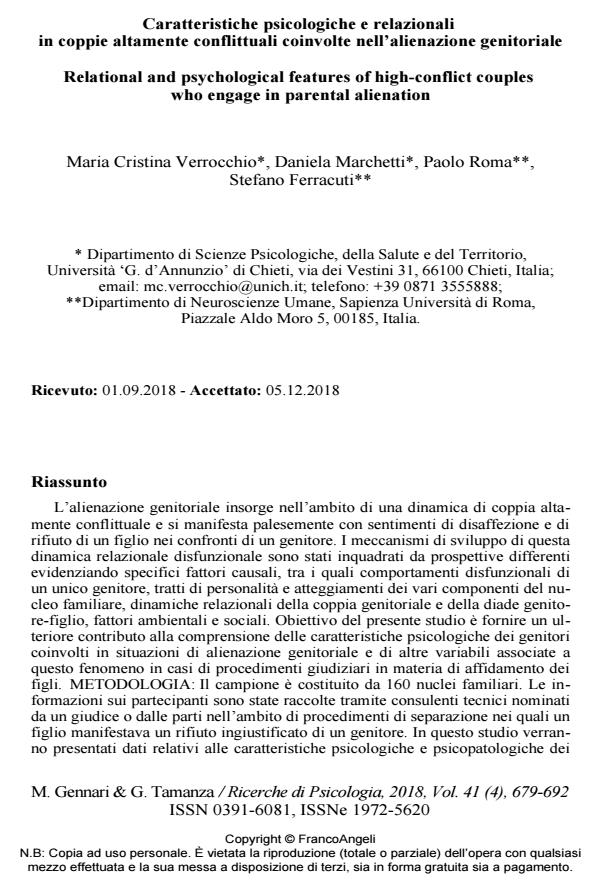Relational and psychological features of high-conflict couples who engage in parental alienation
Journal title RICERCHE DI PSICOLOGIA
Author/s Maria Cristina Verrocchio, Daniela Marchetti, Paolo Roma, Stefano Ferracuti
Publishing Year 2019 Issue 2018/4
Language Italian Pages 14 P. 679-692 File size 189 KB
DOI 10.3280/RIP2018-004008
DOI is like a bar code for intellectual property: to have more infomation
click here
Below, you can see the article first page
If you want to buy this article in PDF format, you can do it, following the instructions to buy download credits

FrancoAngeli is member of Publishers International Linking Association, Inc (PILA), a not-for-profit association which run the CrossRef service enabling links to and from online scholarly content.
Parental alienation (PA) is a family dynamic in which a parent engages in be-haviors that are likely to foster a child’s unjustified rejection of the other parent. The developmental mechanism of PA has been explained with hypotheses that range from specific behaviors of one parent to an interaction of many factors including behaviors of both parents, personality predisposition of family mem-bers, parenting and parent-child relationship patterns, environmental and social factors. The present study was carried out to further contribute to the knowledge about psychological features of parents and other significant factors associated with PA in child custody cases. METHODOLOGY: The sample consisted of 160 family units. Information about participants was collected by professionals sur-veyed about their reports provided to the court in cases of separation-divorce, where a child clearly rejected one of the parents. In this study we consider par-ents’ psychological characteristics and psychopathology, attitudes and behaviors towards the offspring, and quality of the relationship between parents and their family of origin. RESULTS: The preferred parent generally puts discrediting or denigrating attitudes towards the other parent. The reactions from the preferred parent are mainly constituted by a passive acceptance of rejection without any opposition. The psychological profile of preferred and refused parents is marked by significant differences. In a high number of cases, the family of origin sup-ports the hostility of their son to the other parent. CONCLUSIONS: More knowledge about parents psychological features and other risk factors re-lated to PA may be of value for mental health professionals to assess these fami-lies. Moreover, understanding the key characteristics of families involved in PA dynamics could contribute to prevent this phenomenon and improve tailor-made interventions.
Keywords: High-conflict couples, parental alienation, preferred parent, target-ed parent.
- MMPI-2 Profiles of Mothers Engaged in Parental Alienation Paolo Roma, Daniela Marchetti, Cristina Mazza, Franco Burla, Maria Cristina Verrocchio, in Journal of Family Issues /2021 pp.722
DOI: 10.1177/0192513X20918393 - A Comparison of MMPI-2 Profiles Between Parental Alienation Cases and Custody Cases Paolo Roma, Daniela Marchetti, Cristina Mazza, Eleonora Ricci, Lilybeth Fontanesi, Maria Cristina Verrocchio, in Journal of Child and Family Studies /2022 pp.1196
DOI: 10.1007/s10826-021-02076-1 - Court-appointed expert consultation in Italy: an ethnographic study of parents’ beliefs, expectations, and experiences Antonio Iudici, Francesca Rainieri, Tania Fiorini, in Frontiers in Psychology 1668693/2025
DOI: 10.3389/fpsyg.2025.1668693
Maria Cristina Verrocchio, Daniela Marchetti, Paolo Roma, Stefano Ferracuti, Caratteristiche psicologiche e relazionali in coppie altamente conflittuali coinvolte nell’alienazione genitoriale in "RICERCHE DI PSICOLOGIA " 4/2018, pp 679-692, DOI: 10.3280/RIP2018-004008